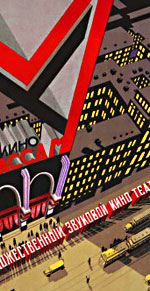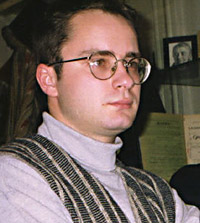
| Jacket 36 — Late 2008 | Jacket 36 Contents page | Jacket Homepage | Search Jacket |
This piece is about 3 printed pages long. It is copyright © Aleksandr Anashevich and Vitaly Chernetsky and Jacket magazine 2008. See our [»»] Copyright notice. The Internet address of this page is http://jacketmagazine.com/36/rus-anashevich-trb-chernetsky.shtml

Back to the Russian poetry Contents list
Pavlov’s Dog
It did not fall, nor bark, nor howl
ran out of the last train
ran from grandpa and grandma, ran from the law
sweet sweet life: death, pitchfork
“not wool on me but long long
black human hair
I won’t freeze even at the north pole,”
it said to pavlov in a woman’s voice,
“I won’t freeze even inside your heart
even without a heart, I won’t freeze under the scalpel
my hair will become fire
all ablaze I will leave you, walk out into the cold crisp air
pavlov, you are mean, I did not know this, I used to love you
I did not love you at first, then did, then stopped again
all of it out of despair, on an IV, day in, day out
I thought, looked in your blue eyes
I know, pavlov, that you won’t turn to bestiality
or marriage, or even drink to friendship
you only want to cut my little body into scraps
a ripper, you do it tenderly, like a professional, with even breath
my ovaries are gone now, cerebellum, spleen
one of my eyes, shinbone, eardrum
I stand there half-dead, covered in iodine
who will save me, pavlov, out of this vortex
I’m a dog, pavlov, a dog, pavlov’s dog
not anna pavlova, vera pavlova, or pavlik morozov[1]
not even lena from moscow who cried over me and
called me, all aflame, a shrapnel rose
let me go, release me, despite my injuries
being a cripple is not so bad, at least I’m not a cat
let me go, kick me out
but tenderly, lovingly, as if by accident
and I will run run run fly like I had wings
between cars to freedom to the dump to an changed space
you have taught me, pavlov, to admire this world
so mysterious, boundless, and beautiful”
I Heard: An Actor from the Burnt-Down Theater
I move from war and war, between Jean and Jean.
Lights fall, firecrackers explode: all these are bad signs.
Soldiers and clowns do not amuse me.
They threw me out of the theater, leaving my things–rouge and powder.
Until the morning I’d run between the port and train station.
It’s cold, February, emptiness, snowstorm.
If they let me into the train car, I’d tell the passengers
That I once had fame and money, all taken by the fire.
They’ll wrap me in velvet, cashmere, and the past will be a nightmare,
I’d be the train’s emperor, a railway emir.
Forty drops in a glass, forty grams — this can be considered a feast.
If only they didn’t throw me out of the train car, take me all the way to Poland or
to some other place, as long as it’s far away,
to a city with a large square where I could put my little theatre booth .
I would stop running, become a holy fool, my handwriting would change.
But my clothes are stained by war, coal, and ashes.
A hundred washerwomen couldn’t scrub them clean.
The South
How can you live inside an attic, how can you speak from way up there?
Look out at the raised branches of the hazelnut, fig, and juniper.
You don’t convince your friend, the nurse, over the phone.
He doesn’t agree: almost a skyscraper, twelve stories, no elevator.
Went to a corner store, got bread and wine on barter.
Hoped for a different deal, the cards cannot be trusted.
It is the south, tropical showers in winter, water cascades from the ceiling.
Humidity makes you limp, i.e. not up for prideful lechery.
Inside my mouth two golden bees kiss each other’s wings.
They whisper, “How can we break out, and fly away from this crimea?”
Go head, have a good think, the mind won’t quench your thirst from the cold tap.
I know: sooner or later you will abandon me.
The living never live this high, even geraniums wither.
Only the handsome aviators are at home, but they are heroes.
They naively tell how cold it feels inside at take off.
The exclusive happiness of the sparrows and the pigeons.
* * *
nobody knows that I’m a changeling
that every seventh night I am a bird above the city
but I am foolish: fall in love with every stranger in the night
these ordinary guys are mostly drunk and lonely,
and on each flight I watch them change into gold and diamond
I touch down on their shoulders and like in the fairytale by oscar wilde
my sparrow heart is left on the pedestal
the morning slides off, a copper coin onto the asphalt
[1] Anna Pavlova was a famous ballerina; Vera Pavlova is a noted contemporary Russian poet; Pavlik Morozov was a teenage boy made a hero by 1930s Soviet propaganda for denouncing his own parents.

Aleksandr Anashevich
Aleksandr Anashevich(1971) works as a freelance journalist. He has published four books of poetry, two of which were shortlisted for the Andrei Bely Prize. He lives in Voronezh.